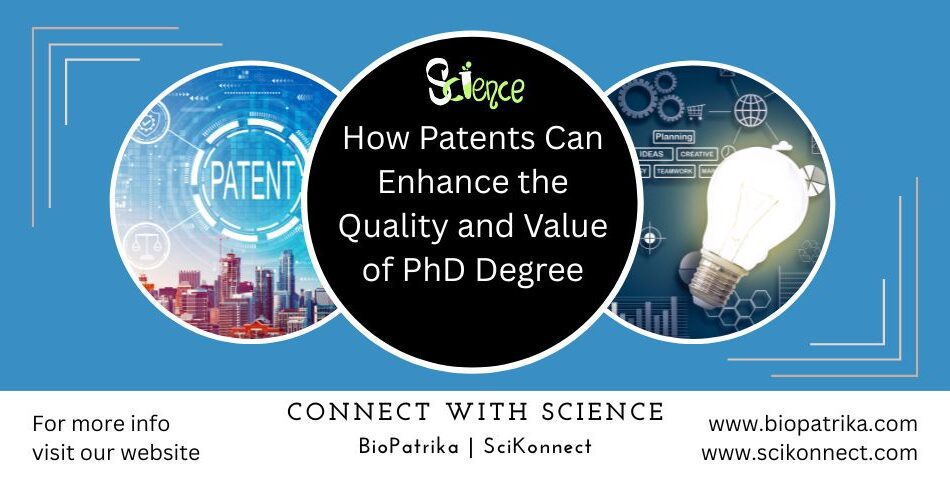How Patents Can Enhance the Quality and Value of PhD Degree
1. Driving Practical and Market-Oriented Innovation
PhD research often focuses on theoretical advancements or niche problems, but the inclusion of patents encourages researchers to consider the practical applications of their work. A patent requires a novel, non-obvious, and industrially applicable invention, pushing PhD candidates to design solutions that address real-world challenges.
For instance, a PhD candidate in materials science might develop a new composite material during their research. By pursuing a patent, they are compelled to refine their invention to meet market demands, such as scalability or cost-effectiveness. This process sharpens critical thinking, problem-solving, and the ability to translate theoretical insights into practical outcomes.
2. Enhancing Research Rigor Through Patent Examination
The patent application process is a stringent evaluation of an invention’s novelty, inventive step, and industrial applicability. Unlike academic peer review, patent examination scrutinizes the uniqueness and utility of an idea against global prior art.
Feedback from patent examiners can provide valuable insights, helping researchers refine their ideas or identify new directions. For example, a PhD student in biomedical engineering developing a novel diagnostic device might discover that their design needs improvement to avoid infringing existing patents.
3. Increasing the Value of Research Through Commercialization
Patents transform PhD degree research from an academic exercise into a potential economic asset. A patented invention can be licensed, commercialized, or used as the foundation for a startup, creating tangible value for the researcher, their institution, and society.
For example, a PhD candidate in computer science who develops a new algorithm for data encryption could patent their innovation, attracting interest from tech companies or investors.
4. Fostering Interdisciplinary Collaboration
Patenting often requires collaboration between researchers, legal experts, and industry professionals. Engaging with patent attorneys helps researchers articulate their work clearly and concisely. Working with industry partners to assess commercial viability exposes PhD candidates to diverse perspectives.
For instance, a PhD student in chemical engineering developing a new catalyst might collaborate with industry experts to test its scalability, leading to improvements in research and application.
5. Building a Bridge Between Academia and Industry
Patents serve as a bridge between academia and industry, aligning PhD research with market needs. This increases societal impact as patented innovations are more likely to be adopted or commercialized.
A PhD researcher in renewable energy who patents a novel solar panel design may attract partnerships with energy companies, validating the research and enhancing their professional reputation.
6. Encouraging Long-Term Research Impact
Patents provide legal protection for inventions, ensuring that contributions are recognized and preserved. This protection encourages ambitious research and can attract further funding post-PhD.
For instance, a patented medical device developed during a PhD could lead to further funding to refine the technology or explore new applications.
7. Challenges and Considerations
While beneficial, patents come with challenges. The process is time-consuming and costly, and the emphasis on commercialization may conflict with open knowledge sharing.
Not all PhD research is patentable. Still, the principles of identifying novelty and societal relevance can inspire researchers to broaden the impact of their work.
Conclusion
Incorporating patents into PhD research offers a transformative opportunity to enhance doctoral work. Patents push researchers to produce work that is not only academically excellent but also socially and economically impactful.
As universities increasingly bridge academia and industry, patent training in PhD programs can equip researchers with essential skills for modern innovation. Patents empower PhD candidates to create lasting value, ensuring their research leaves a meaningful mark on the world.
🔒 Protecting Your Innovations
Interested in filing a patent? Check out our specialized IP services tailored for researchers, faculty, and startups.
Our Services Include:
- Novelty & Patentability Searches
- Utility Patent Drafting & Filing (India, US, PCT, etc.)
- Design Patent Drafting & Filing (Global)
- Trademark Filing & Searches
- Invalidity, FTO / Clearance Searches, Landscape Analysis
- Faculty Development Programs & Workshops
- Patentable Invention Development for Students & Entrepreneurs
- Technology Scouting & IP Portfolio Management
Empowering Innovation:
- Maximize your chances of patent grant
- Tailored services to meet your needs and budget
- Expert support across sectors like healthcare & medicine
- Support for students & researchers to patent thesis ideas
- Faculty guidance on identifying patentable work
- Startup IP support – patents, copyrights, designs
- Help with existing applications – responses & hearings
🚀 Explore Resources & Opportunities
Ready to level up your research career? Explore, apply, and grow with these handpicked resources!
- 🔍 Major Regulatory Agencies Across the World
- 💼 Find Jobs in Science & Biotech
- 🎓 Azim Premji Scholarship for Girls
- 🧪 Free Online Workshop on Nanotechnology | SciKonnect2025
- 🗣️ Science Communication Career in India: Is a PhD Necessary?
- 🌍 PhD & Postdoc Positions Around the Globe
- 🎯 Internships, Fellowships & Grants
💡 Need help with CVs, SOPs, or networking? Email us at scikonnect@gmail.com – we’ve got you covered!
🔗 About Career Konnect
Career Konnect by Biopatrika is your go-to platform for discovering diverse career pathways in science. From academia to industry, science communication to patent law, we bring inspiring stories, expert interviews, job updates, and practical resources to help students, researchers, and professionals navigate their career journeys with clarity and confidence.
Empowering the next generation of scientists—one career story at a time.


